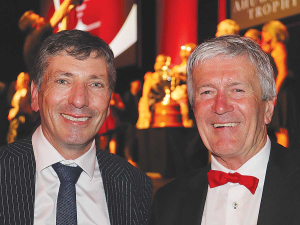MIA launches 2026 Red Meat Sector Dragon’s Den for innovative ideas
The Meat Industry Association (MIA) is once again looking for game-changing ideas for New Zealand's red meat processing and exporting sector.
 Beef + Lamb NZ's Sam McIvor and Agriculture Minister Damien O'Connor at this year's Ahuwhenua Awards ceremony.
Beef + Lamb NZ's Sam McIvor and Agriculture Minister Damien O'Connor at this year's Ahuwhenua Awards ceremony.
A dramatically changing world, in terms of the global economy and consumer preferences, is the focus for a new ten-year Red Meat Sector Strategy.
The strategy is a partnership between the Meat Industry Association and Beef+Lamb NZ and is a revision of the first one, which was unveiled in 2011.
Its vision is growing sustainable value with the outcome being greater profitability, sustainability and resilience across the sector. The new strategy also pushes for increased value for customers and consumers. The other outcomes are for greater social and economic benefits to NZ and a focus on enhancing the integrity and trust of the red meat sector.
According to MIA and Beef+Lamb NZ, the aim is lift innovation and performance, build a platform to create and capture greater value for our products. The industry also wants to stimulate economic growth and employment and establish it as trusted guardians of animals, water and land – as well as enhancing the reputational capital of the red meat sector.
Beef+Lamb NZ chief executive Sam McIvor says the first strategy, produced in 2011, was all about the restructuring of the meat industry and trying to extract better profits along the value chain.
“It was also quite focused on driving the uptake of technology on farm.”
McIvor says in the last seven years there has been a huge shift in the way the entire sector operates with much greater cooperation and a realisation that working together has tangible benefits to all parties. He says a recent example of this was how well the sector handled the Covid lockdown.
Beef+Lamb chair Andrew Morrison says the significance of the sector coming together cannot be underestimated. He says this has led to a range of joint venture initiatives, not the least of which has been Taste Pure Nature – a brand platform to underpin exporters’ marketing programmes and enhance the positioning of New Zealand red meat.
“MIA and Beef+Lamb NZ have been on the Taste Pure Nature journey together and it is working well,” he says.
A word that seems to be centre stage in the primary sector at present is sustainability in all its forms. According to McIvor, a new world is emerging where there is greater knowledge and interest about resources and how these are being used – especially in food production.
“We see that gathering real momentum internationally and if we think about it historically when we used to talk to our foodies, climate change wasn’t a thing they were focused on,” he told Rural News. “But this is something that is changing quite quickly and is a real concern to people.”
However, behind the focus on sustainability is a cost on farm. McIvor points to increasing compliance and regulatory costs all of which affect farm profitability. To that end, he says one of the objectives of the strategy is find a way of paying for these increased costs.
The new strategy for the next five years has a particular emphasis on innovation on farm, as well as processing plants and in products. McIvor says the sector will look at improved market access for our product and how it can be differentiated from our competitors – as well as the obvious focus on sustainability.
“The goal is to extract more value from our businesses to meet the higher cost structure and finding customers internationally that are willing to pay a bit more for our products because of their social attributes,” McIvor adds.
Norwood has announced the opening of a new Tasman dealership at Richmond near Nelson next month.
Buying or building a rural or semi-rural property? Make sure you know where the wastewater goes, says Environment Canterbury.
With collars on more than seven million cows worldwide, Nedap says its standalone launch into New Zealand represents world-leading, reliable and proven smart technology solutions for dairy farmers.
The Meat Industry Association (MIA) is once again looking for game-changing ideas for New Zealand's red meat processing and exporting sector.
Environment Southland is inviting feedback on two bylaws that play a critical role in safeguarding the region's waterways and ensuring the safety of the local community.
While the North Island is inundated with rain, Southland is facing receding water levels as warm weather and lack of rainfall continues.

OPINION: Meanwhile, red blooded Northland politician Matua Shane Jones has provided one of the most telling quotes of the year…
OPINION: This old mutt has been around for a few years now and it seems these ‘once in 100-year’ weather…